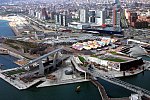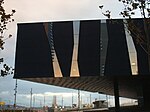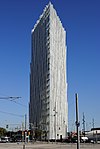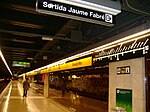Hilton Diagonal Mar Barcelona
Catalan building and structure stubsEuropean hotel stubsHilton Hotels & Resorts hotelsHotel buildings completed in 2004Skyscraper hotels in Barcelona

Hilton Diagonal Mar Barcelona is a skyscraper and hotel in Barcelona, Catalonia, Spain. Completed in 2004, has 25 floors and rises 85 metres. It is part of Hilton Hotels. Lies on Passeig del Taulat street 262â264. In the beginning of 2019, the hotel completed an extensive renovation program.
Excerpt from the Wikipedia article Hilton Diagonal Mar Barcelona (License: CC BY-SA 3.0, Authors, Images).Hilton Diagonal Mar Barcelona
Passeig del Taulat, Barcelona
Geographical coordinates (GPS) Address Phone number Website External links Nearby Places Show on map
Geographical coordinates (GPS)
| Latitude | Longitude |
|---|---|
| N 41.4092 ° | E 2.2175 ° |
Address
Hilton Diagonal Mar Barcelona
Passeig del Taulat 262-264
08019 Barcelona (Sant MartĂ)
Catalonia, Spain
Open on Google Maps







